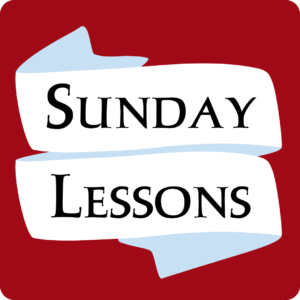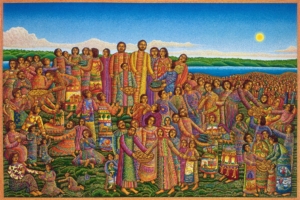Worship Guide for K’s Ordination
May 24, 2025
Click below for the service booklet.
Like TV Guide, but from God! Find the text of the Prayers of the People and Sermon below. Use the buttons provided to find other worship materials.
To see the Worship Guide for other weeks, click here.
To see the Book of Common Prayer online, click here.
Prayers
Rooted in Abundance
The Reverend Linda Mackie Griggs
Readings:
- Deuteronomy 15:7-11
- PSALM 37:27-33, 39, 41
- Ephesisans 4:25-5:2
- Luke 9:10-17
Sermon Recording:
It may seem to many of us here, as we look toward Pentecost and the long season that follows, that we have left Easter somewhere back there in the dust, while actually there are about two weeks still to go in the Easter season. So we are not (nor, frankly, should we ever be) finished with pondering the Easter question: What is ours to do as the People of Resurrection that we are called to be? A short answer is that we are called to see the world through the eyes of the heart of Jesus. A longer and more honest answer is that we are called to the difficult work of seeing a broken and dangerous world through the eyes of the heart of Jesus; we are challenged to proclaim Resurrection in every part of our lives; to proclaim, as K noted in her most recent sermon, that in spite of Death’s attempts to crush our faith, God will keep resurrecting life.” Again, and again, and again.
God keeps resurrecting life. Abundant life. That is the promise, the invitation, and challenge, of Easter.
[Jesus] said to them, “You give them something to eat.”
God’s promise of abundance is clear in our Gospel reading—and no one who knows K will be surprised that they have chosen a passage for today that is about food—providing lots—and lots—of food, for lots—and lots—of people. The loaves and fishes account never fails to resonate, not least because it taps into one of the most common urges of all of God’s creatures—hunger. All living things need nourishment; perhaps this is why Jesus proclaims God’s economy of generosity through something as simple as a bit of bread and a couple of fish. By the prodigious grace of God, though, it is enough–and more than enough–for everyone. God’s abundance is enough, and God’s enoughness is the true abundance for which we hunger.
And God’s children hunger for so much, and in so many ways.
The Bishop’s charge to K in a few minutes will be to, in the name of Jesus, serve all people, particularly the poor, the weak, the sick, and the lonely—to feed those who hunger for the kind of nourishment that provides wholeness to the broken, balm to the wounded, companionship for the isolated.
“You give them something to eat.”
Can you just picture Jesus pointedly looking each disciple in the eye: They are deer in the headlights in the face of thousands of famished people; the provisions in front of them are meager; and all they can do is blather about how big the problem is and how they just don’t have the funds to address these pressing needs.
Jesus will have none of it.
You. Give.
Quit whining and making excuses. Get organized, and give these people what they need.
How totally like a deacon.
Identify a need, bring it to the Church, don’t take no for an answer, let God do the work.
Jesus shows how deaconing is done.
A deacon’s motto could well be, “God doesn’t call you into your comfort zone.” Deacons act as a bridge between the world’s hungers and the Church’s vocation to serve; seeing the world through the eyes of the heart of Jesus, and calling us to do the same, in a voice that is not timid, and with hands that continually nudge us toward the margins where the greatest needs are found.
And while some are called by God to be set apart, as K will be today, for a specific ministry of servanthood under the direction of the Bishop, this does not let the rest of us off the hook. Every one of us is called and challenged to seek and serve Christ in all creatures; to seek out those whom the World dares (wrongly) to view as Least, and to offer them seats at God’s banquet of wholeness, healing, and justice. We are all called to a ministry of compassion to our neighbor. No exceptions.
This was the life and ministry of Frances Perkins, Secretary of Labor, first woman cabinet member, and extraordinary Episcopalian, whose feast day was last week, and for whom today’s lessons were appointed in the Lectionary. Perkins had the ear of President Roosevelt for an amazing twelve years; and when I say she had his ear, I can almost imagine that literally–gripping it to get his attention. Her biography says, “In an administration filled with compromise, the president’s support for the agenda of Frances Perkins was unusually constant.” Why? Perhaps because there was no daylight between her pursuit of fairness and justice for working people and her spiritual life and discipline—Frances Perkins had the heart of a deacon: Identify a need, make it known to those who can do something about it, don’t take no for an answer, let God do the work.
So the roots of what we witness today in K’s ordination lie where it lay with Frances Perkins; in our Baptismal Covenant—in our primary identity as members of the Household of God. And all three orders of ordained, ministry—Deacon, Priest, and Bishop—are rooted in the others, each building upon the other: A deacon’s identity is rooted in their first identity as a Christian. As a priest, I retain my identity as a deacon, and as a bishop, Bishop Knisely retains his identity as a priest and deacon, even as he has been set apart as shepherd for all of the priests, deacons, and laypeople in his flock. It is a hierarchy, yes, but the crucial—vital–point here is that no ordained person is detached from their roots. Our identity is fed and nourished by those for whom we care—all of those who we are called to see through the eyes of the heart of Jesus.
Our friend, colleague, and loved one, K, will shortly be made a deacon in God’s Church; a transitional deacon, which is what we call one who will be ordained again, God willing, as a priest, in about six months. The technical understanding of a transitional deacon is that this six-month period is a time for learning the practical aspects of priesthood—the nuts and bolts of what hasn’t been covered in seminary, or that may have been covered, but we quickly learn that there is a big difference between the classroom and the day-to-day/Sunday-to-Sunday work of being a priest—juggling vestry meetings, pastoral care, and sermon-writing with fixing a broken photocopier, a leaky roof, and getting a parochial report out on time… It is all of that, and at first it can be like the proverbial drinking from a firehose. With a straw.
Yes, and.
K, this is for you: This transitional time is liminal time, a threshold between the life that has formed you and the new life into which God has called you; a threshold between your roots and your blooming. In this place of transition your past and future meet in a sacred present where the servanthood ministry of a deacon will become entwined with the sacramental leadership that is priesthood. You are the gardener in this time, so relish every liminal moment—nourish and tend your vocation with creativity, patience, courage, curiosity, humor, and your trust in God. And then hold it all lightly so that the lows don’t lead to despair, and the highs don’t make you forget your roots.
And finally, as you enter into this sacred time and begin to wrap your head and heart around this new vocation and the people you are called to feed, both physically and spiritually, know that you are not, even for a minute, alone. You are supported by family, friends, and colleagues who love and believe in you; by a new community at Holy Trinity who cannot wait to have you join them; and by your St. Martin’s Church family, who are so sad to see you go, but who send you forth with our love, and who will uphold you with so many prayers that your feet won’t touch the ground.
May God sustain, enfold you, and shower you with blessing. And may you bloom. In abundance.






